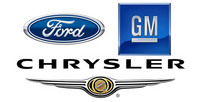No Concensus on Auto Company Loans
WASHINGTON DC December 5, 2008; John Crawley writing for Reuters reported that there is broad understanding of distress but no consensus yet in Congress to rescue U.S. automakers as industry chiefs hope on Friday to advance their case in a second appearance before lawmakers in two days.
"You've got to be a lot further along than where we are," Senate Banking Committee Chairman Christopher Dodd of Connecticut said on Thursday about prospects for quickly vetting disparate, complex ideas about industry restructuring and building support for a coherent approach.
According to a senior Republican aide in the House of Representatives, support is thin among Republicans in that chamber for a $34 billion bailout with a sense that "if we come in and give money now", General Motors Corp, Ford Motor Co and Chrysler LLC will be back for more.
Another Republican House member said lawmakers want to gauge the mood after Friday's Financial Services Committee hearing before deciding to back or oppose a rescue. Some ideas brought up during the hearing were bankruptcy, a restructuring similar to bankruptcy that would take place outside a court, or a merger.
Congressional Democratic leaders would like to address the matter in the House and Senate next week.
House Speaker Nancy Pelosi said earlier in the week that Congress or the Bush administration would have to act quickly to prevent the collapse of one or more automakers.
The warnings grew more ominous on Thursday before Dodd's committee.
"I believe we could lose General Motors by the end of this month," Ron Gettelfinger, president of the United Auto Workers told lawmakers. "Honestly, we're down to the wire."
Chrysler is also hemorrhaging cash and could falter soon, officials said.
Although struggling, Ford came to Washington in the best financial position but still worried about failure of a rival because of shared suppliers and other related businesses that could be hurt.
Chief executives Rick Wagoner of GM, Alan Mulally of Ford and Bob Nardelli of Chrysler were candid about their companies' finances and awful prospects during Senate testimony.
Unlike two weeks ago when the three were criticized as unprepared and unconvincing in their initial bid for a bailout, lawmakers credited them in their second try with bringing more clarity to the discussion.
Despite the better performance in testimony and some praise for fuel efficiency efforts at Ford and GM, senators still raised Detroit's long-standing credibility problems in Washington and new wariness of corporate bailouts.
GM and Chrysler want immediate loans to forestall possible failure, while Ford is asking for a $9 billion credit line that would be tapped later if necessary. GM wants $12 billion in loans -- $4 billion now -- as well as a $6 billion credit line. Chrysler wants $7 billion immediately.
Wagoner and Nardelli said they would consider renewing the idea of a merger of their companies if it would clinch a bailout. Gettelfinger said such a deal would result in "unbelievable" job losses.
Chrysler, the smallest of the Detroit Three, employs about 60,000 people.
But the alternative of bankruptcy and possible liquidation, as Tennessee Sen. Bob Corker pointed out in razor sharp questioning of Gettelfinger, Wagoner and Nardelli, would be devastating as well.
Corker said there were alternatives but the industry as it stands would have to shrink.
"There's nobody that I know of that thinks that three companies with the market share that you have, the downward trend that exists, the unsustainable debt that's out there -- there's nobody, no thinking person thinks that all three companies can survive," Corker said.
Corker and other senators on Thursday proposed the Chrysler/GM merger scenario and bankruptcy like restructurings as possible conditions for extending bailout loans. But the six-hour hearing ended with Dodd saying he would still work toward a legislative remedy.
"I'm not opposed to trying, but there may be other combinations of things that could be done to allow us to move forward," Dodd said.
Dodd said he would push harder for the Treasury Department and the Federal Reserve to extend immediate aid through the ongoing corporate rescue program for financial services firms -- an option dismissed by Republicans and the White House.
Pelosi and other Democratic leaders also pressed the Bush Administration on Thursday to take action on its own.
Another option that drew little attention at Thursday's hearing but gained some traction in the hallways of Congress is a compromise aid plan floated two weeks ago by auto state senators. The initiate would redirect up to $25 billion in loans already approved by Congress for helping automakers retool factories to make more fuel efficient cars.
This idea is favored by the White House but so far opposed by Democratic leaders worried about possibly undercutting new auto fuel efficiency mandates for Detroit.
Additional reporting by Richard Cowan; editing Carol Bishopric



